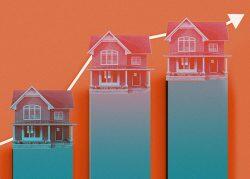Bay Area home buyers are being hit by a “double whammy” of higher prices and rapiding rising interest rates, according to Compass Chief Market Analyst Patrick Carlisle, raising median monthly payments over 50% in just one year and further eroding affordability in the region.
Using yet-to-be-released data, Compass will show in an upcoming report that historically low interest rates over the last few years “effectively subsidized” rising home prices, Carlisle said via email. The low rates kept the median monthly Bay Area housing payment around the $4,000 mark for a three-bedroom home since 2018.
With interest rates up from about 3 percent 12 months ago to around 5 percent today–and a steady run of price increases over the same period–the median monthly payment was $6,275 in March of this year, assuming a 20% down payment and a 30-year-fixed conforming loan.
In some East Bay markets, median monthly payments for a three-bedroom home are up 75% in just the last year, according to Compass data from its April market reports. In San Francisco and the Peninsula, where home prices were higher to begin with, monthly payments are up 35% to 45%. Median monthly payments in Marin are up about 60%, according to the analysis.
The monthly payment amount is perhaps the most meaningful calculation for buyers, Carlisle said, which is why he added the median cost analysis to Compass’ monthly reports recently.
“People and the media fixate on prices because they’re easy to grasp and dramatic, easy to calculate ups and downs, but for most people, what really matters is the monthly housing cost (whether rent or home payment),” he said.
“Work from home and people’s desire for more space and less population density (due to pandemic issues) supercharged the East Bay markets,” Carlisle said. “Also, to someone moving from SF/Silicon Valley to the East Bay, the home prices there look ‘cheap,’ which fosters a willingness to overbid prices.”
Carlisle said he expects homes priced at the lower end of the spectrum in all markets to feel the bite of rising monthly costs first, and that vacation-home locations may be “deeply affected” since “no one needs to buy a second home.” So far, residential agents have reported no signs of a slow down in the area, due to a continued lack of inventory and a pool of wealthy buyers who are affected more by the stock market than interest rates.
Yet what starts out impacting home buying decisions for those on the lower end may work its way up the market, Carlisle predicted, as media reports about rising costs could impact perceptions across the region, even into the highest income levels.
“Even a billionaire’s psychology on buying a home shifts if they are reading articles about dramatically changing market dynamics,” he said.
Read more

